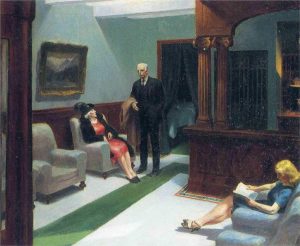 “The Truth About What Happened” is a very short story, told from the perspective of an FBI special agent who has just come out of his deposition for an unspecified case. From the very beginning it is clear that he has something to hide, as one of the first things he does is to go into his method of avoiding saying anything he shouldn’t: counting to three. He also addresses the reader in this paragraph, saying of his method: “Try it. One day it will save your ass.” Thus, from the first paragraph, he establishes himself as an unreliable narrator. He is a man who has something to hide, and he is aware of the reader as an existing character in his world.
“The Truth About What Happened” is a very short story, told from the perspective of an FBI special agent who has just come out of his deposition for an unspecified case. From the very beginning it is clear that he has something to hide, as one of the first things he does is to go into his method of avoiding saying anything he shouldn’t: counting to three. He also addresses the reader in this paragraph, saying of his method: “Try it. One day it will save your ass.” Thus, from the first paragraph, he establishes himself as an unreliable narrator. He is a man who has something to hide, and he is aware of the reader as an existing character in his world.
After the first deposition, he is asked to give a second statement, off the record, for the private use of his interviewers. There is only one instance throughout the entire story where his method is explicitly put to use: he counts to three before he tells the interviewers his name. It is safe to assume that he uses the trick before every response, but it is only called attention to in this context. The majority of the story is a dialogue between “Albert” and the interviewer, Slaughter. Albert tells Slaughter a story wherein he pursues potentially problematic information about a possible recruit to the FBI, Sherman Bryon, but in the end, it turns out that there was no dirty secret after all. The story is rather anticlimactic and seems to suggest no wrongdoing on anyone’s part. It is convincing to Slaughter, and Albert leaves his second deposition once again feeling pretty good about it, having said nothing he didn’t want to say, and having told “some of the truth.” He then, in the final paragraph, states: “We won it for them in the end. Then they turned on us. But old Sherman Bryon was dead by then, so it didn’t matter.” He reveals an interesting piece of information here: that Sherman Bryon’s death made a case against Albert and his people insignificant. No more information is available.
It is tempting to attempt to piece together what little information we are given, but it would be fruitless. The narrator has carefully chosen what to tell us – we have less of a chance of figuring out the real truth than the investigators.